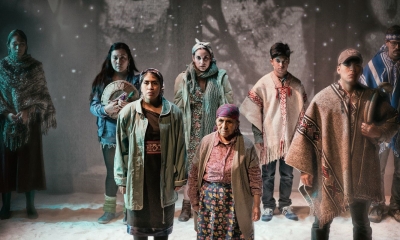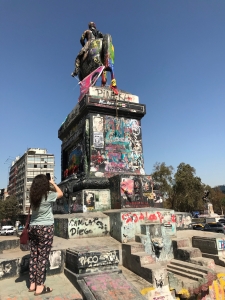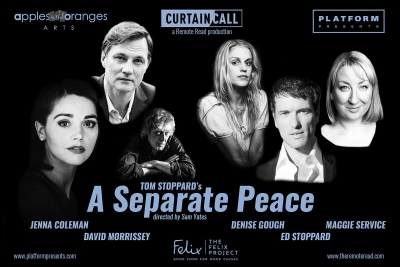If you live in Hong Kong, you don’t need me to tell you about Great Britain’s history of colonialism. At the start of the 20th century, the British Empire covered nearly a quarter of the planet. Hong Kong, which it occupied from 1841, was a small part of the largest-ever empire.
Like all empires, it wasn’t to last. At the end of the Second World War, it began to shrink as countries claimed independence one by one. The process culminated in the formal handover of Hong Kong to China in 1997. Today, after just a few decades, the British Empire no longer exists.
Attitudes take longer to change than territory, however. The Empire has gone but in my country the colonial mindset persists. In the popular imagination, Great Britain is still at the centre of the world, powerful, influential and respected. In this out-dated vision, it is a world in which white people—white men in particular—are in charge.
A small number of those white men end up being theatre critics. Do they also regard themselves as colonialists? I doubt it. More likely they see themselves as liberal-minded arts lovers. Opposed to discrimination, embracing the modern world, they are not people you would think of as racist.
For this reason, I was intrigued when I heard the actor Emmanuel Kojo had persuaded Equity, the actors’ union, to launch a campaign against racist theatre reviews. As a white middle-aged man myself, I was largely blind to the problem Kojo had identified. Although I was aware of some egregious examples of racist commentary, I regarded them as outliers. In 2018, for example, The Sunday Times described a televised Royal Shakespeare Company production of Macbeth as being “less garishly diverse” than a previous production. It was a horrible thing to say but the view seemed out of step with mainstream opinion.
Not so, Kojo would say. Talking to The Stage newspaper, he argued that white critics never referred to the colour of a white actor’s skin, but routinely did so for non-white actors. White was the default and anything else was, he said, “cause for constant mention and discussion”. What he was identifying, in other words, was not the overt racism we associate with the far right, which is as easy to spot as it is to condemn, but a more insidious form of racism born of blinkeredness and complacency.
Like the male gaze in cinema, the white gaze in British theatre assumes everyone sees the world from what is actually a partial perspective. White critics subconsciously write for a white readership and, like the colonialists who ran the British Empire, treat whiteness as the norm. This default perspective, intentional or otherwise, regards anyone who is not white as different, other, not one of “us”. The effect is to discriminate and exclude, even if the critics’ intention is the reverse.

Emmanuel Kojo (Photo courtesy of the author and Kojo)
By chance, at the same time as Kojo was promoting Equity’s campaign, playwright Chinonyerem Odimba announced on Twitter she would pay for two black critics to participate in one of my online criticism workshops. Other people matched her generous offer, the numbers grew and I invited Kojo to come as a guest. It was one of the most interesting sessions of the year.
Through this initial contact, I was invited by Ian Manborde, Equity’s Equality & Diversity Organiser, to help devise guidelines for theatre critics wanting to write responsibly about race. Working with fellow critic Laura Kressly and consulting widely, we drew up a set of proposals that would promote empathetic writing without curtailing the freedom to be critical. We called for critics to use their cultural power responsibly, to consider their biases and to approach unfamiliar themes with openness.
The guidelines were published in a special edition of The Stage alongside an excellent set of articles on the question of race and theatre criticism.[1]
The exercise should not have been controversial. We were simply asking critics to treat their fellow human beings with respect. We even began by saying critics should be “free to express themselves openly and honestly without fear or favour”.[2] And yet at least four commentators were outraged.
Most bizarrely, Dominic Cavendish, The Daily Telegraph‘s theatre critic, called the document “positively Stalinist”. Quoted in a news article, he said: “I do not have any obligation to write with an eye continually on those within the theatre industry who wish to subject me to tone policing.”[3]
Why did Cavendish feel so threatened? Nobody had obliged him to write anything nor had they subjected him to “tone policing”. But these open and equitable suggestions put him on the defensive.
Would he prefer not to treat theatre workers with “dignity and equal respect”? Does his cherished “freedom of thought” preclude him from being sensitive? Why should considering his privilege and potential for bias be so “overbearing”?
Cavendish said he was defending freedom of speech but his unwillingness to engage with the guidelines suggests he was defending his position of power. He sounded like a man who was very happy with the way things were and didn’t want to be told otherwise.
The Daily Telegraph followed up this news report with an article by commissioning editor Ben Lawrence who said he was “appalled that Equity are trying to tell me what I can and cannot say”.[4] Curiously, he said he was “not at odds with Equity’s concerns” and went on to list a number of examples of racist writing that he found “pretty horrific” and “disturbing”. His objection seemed not to be to the ideas themselves, but to an “external organisation” trying “to set the agenda”.
“Yes, sometimes critics may seem cruel,” he wrote, “but they need to be given the latitude to be emphatic.” Needless to say, there is nothing in Equity’s suggestions that would stop a critic being emphatic, although cruelty hardly seems a worthy aspiration.
After that, Lawrence had to invent objections. He worried that critics would be “forbidden” from talking about age, race, gender and appearance “even when it’s appropriate”. Yet the document says writing about such characteristics is fine if they “directly affect the production’s meaning”, so there is no disagreement there.
And somehow, he had understood the document to mean that reviews will “fail unless they relate to the critic’s own life”. It said no such thing.
Inventing arguments was also the approach taken by Frank Furedi in RT (formerly Russia Today). He sustained a whole article on the premise that Equity believed “critics can only write objectively about their ‘lived experience'”.[5] The guidelines actually said the opposite: that “true objectivity does not exist,” a phrase Furedi should have known because he quoted it in his article.
Rather than engage seriously with Equity’s plea for critics to write with care, these commentators preferred to situate themselves on one side of a culture war. Writing in The Spectator, Toby Young saw only a “narrow ideological orthodoxy rooted in critical race theory”.[6] Like Furedi, he went on to talk about universality, citing two canonical works from the western repertoire like they were self-evidently appreciated by everyone. As if the guidelines had been drawn up for no reason, written in a world where racism did not exist, he simply asserted that Julius Caesar and Hedda Gabler can speak to people of all backgrounds. Well, that’s all right then.
I’ve focused on the writers who took issue with Equity and have no reason to believe their views are widespread. But their resistance shows how hard it can be to challenge power, even in the benign world of theatre criticism. I don’t mean to say the guidelines themselves are beyond criticism. They can surely be improved. But why couldn’t these writers have acknowledged the problem of racism and resolved to do something about it, instead of acting like they were the ones under attack?
[1] Emmanuel Kojo & Naomi Obeng (Eds.), Special Feature: Race and theatre criticism—We need critical change, The Stage, 21 April 2021. https://www.thestage.co.uk/features/race-and-theatre-criticism–we-need-critical-change
[2] ‘On writing about race: Equity’s recommendations for theatre critics’, https://www.thestage.co.uk/features/race-and-theatre-criticism–on-writing-about-race-equitys-recommendations-for-theatre-critics
[3] Ewan Somerville, ‘Keep actors’ age, race, gender and appearance out of it, theatre critics are told’, The Daily Telegraph, 23 April 2021. https://www.telegraph.co.uk/news/2021/04/23/theatre-critics-should-not-mention-actors-race-gender-age-avoid/
[4] Ben Lawrence, ‘Writers should be free to express their opinions—not strangled by Stasi-like “diversity” rules’, The Daily Telegraph, 29 April 2021. https://www.telegraph.co.uk/theatre/what-to-see/writers-should-free-express-opinions-not-strangled-stasi-like/
[5] Frank Furedi, ‘Equity’s woke indoctrination of theatre critics will cause cultural segregation’, RT, 29 April 2021. https://www.rt.com/op-ed/522483-woke-indoctrination-theatre-cultural-segregation/
[6] Toby Young, ‘The problem with Equity’s anti-racism guidelines’, The Spectator, 1 May 2021. https://www.spectator.co.uk/article/the-problem-with-equitys-anti-racism-guidelines
















